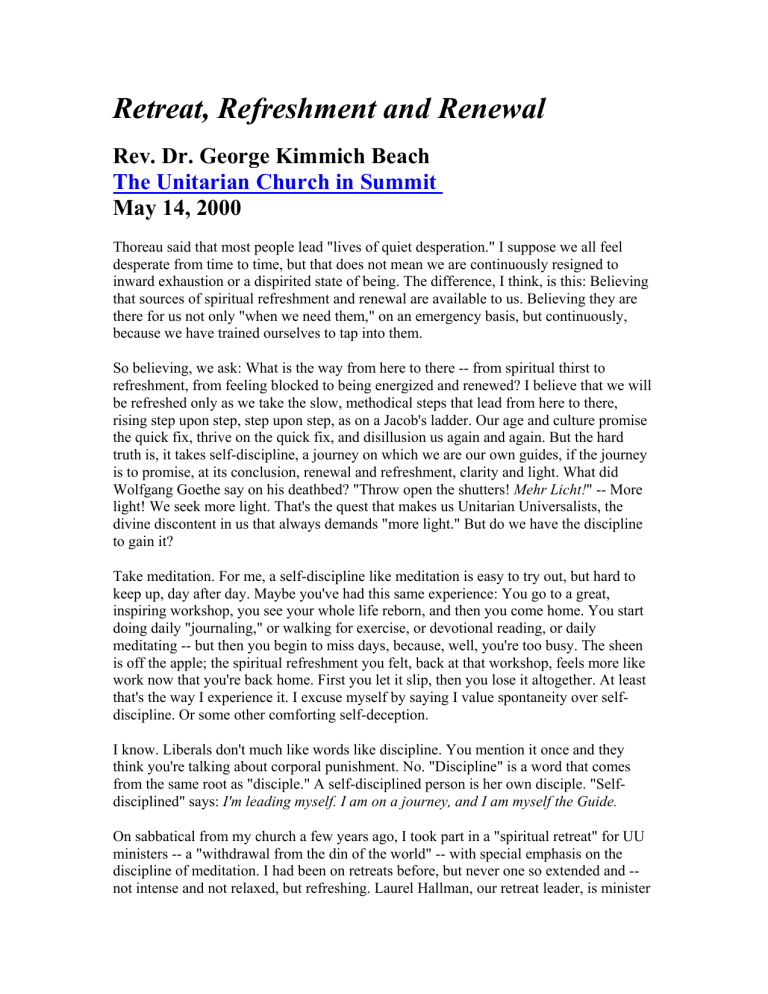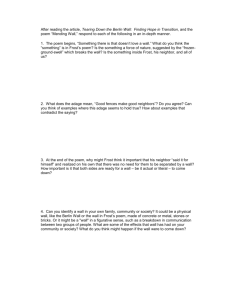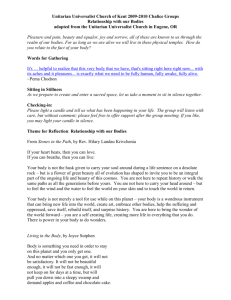Retreat, Refreshment and Renewal

Retreat, Refreshment and Renewal
Rev. Dr. George Kimmich Beach
The Unitarian Church in Summit
May 14, 2000
Thoreau said that most people lead "lives of quiet desperation." I suppose we all feel desperate from time to time, but that does not mean we are continuously resigned to inward exhaustion or a dispirited state of being. The difference, I think, is this: Believing that sources of spiritual refreshment and renewal are available to us. Believing they are there for us not only "when we need them," on an emergency basis, but continuously, because we have trained ourselves to tap into them.
So believing, we ask: What is the way from here to there -- from spiritual thirst to refreshment, from feeling blocked to being energized and renewed? I believe that we will be refreshed only as we take the slow, methodical steps that lead from here to there, rising step upon step, step upon step, as on a Jacob's ladder. Our age and culture promise the quick fix, thrive on the quick fix, and disillusion us again and again. But the hard truth is, it takes self-discipline, a journey on which we are our own guides, if the journey is to promise, at its conclusion, renewal and refreshment, clarity and light. What did
Wolfgang Goethe say on his deathbed? "Throw open the shutters! Mehr Licht!
" -- More light! We seek more light. That's the quest that makes us Unitarian Universalists, the divine discontent in us that always demands "more light." But do we have the discipline to gain it?
Take meditation. For me, a self-discipline like meditation is easy to try out, but hard to keep up, day after day. Maybe you've had this same experience: You go to a great, inspiring workshop, you see your whole life reborn, and then you come home. You start doing daily "journaling," or walking for exercise, or devotional reading, or daily meditating -- but then you begin to miss days, because, well, you're too busy. The sheen is off the apple; the spiritual refreshment you felt, back at that workshop, feels more like work now that you're back home. First you let it slip, then you lose it altogether. At least that's the way I experience it. I excuse myself by saying I value spontaneity over selfdiscipline. Or some other comforting self-deception.
I know. Liberals don't much like words like discipline. You mention it once and they think you're talking about corporal punishment. No. "Discipline" is a word that comes from the same root as "disciple." A self-disciplined person is her own disciple. "Selfdisciplined" says: I'm leading myself. I am on a journey, and I am myself the Guide.
On sabbatical from my church a few years ago, I took part in a "spiritual retreat" for UU ministers -- a "withdrawal from the din of the world" -- with special emphasis on the discipline of meditation. I had been on retreats before, but never one so extended and -- not intense and not relaxed, but refreshing. Laurel Hallman, our retreat leader, is minister
of the First Unitarian Church in Dallas, Texas. She spoke about the importance of having a special place and time, a place and a time set apart, for one's daily meditation. She has a spot in her back yard where she goes, first thing each morning at the same time. Except on Sundays. Her backyard spot is secluded, she says; the only spectacular scenery is the sky. And each morning during her meditation time, at the same time, a helicopter
(probably doing the rush-hour report) races overhead. It doesn't interrupt her, she says; she expects it, she even counts on it; it is part of her universe, breathing in, breathing out.
That's the way we might think of the traffic noise from Springfield Avenue, or the kid noise from the balcony. The Buddha sends these little demons to tempt us out of our concentration. I think silent meditation is important, and that's why I always have a minute of silence following the morning meditation and prayer. I will hear the world outside -- if I let it intrude upon my consciousness. But such background noise, after a while, once you let it be, becomes part of your universe -- the world worth meditating. It is always there, so rather than fight it, I accept it. Call it the noise of the world -- something always there, in the background of life. Acceptance is a step up the Jacob's ladder of self-transcendence.
I suspect, though, that meditation is not for everyone. Fine. But acts of kindness surely are, or ought to be. They can be something very small -- like letting somebody into line in heavy traffic. Or like visiting a friend who's in pain or in trouble. Did you know that doing hospital calls, far from being a burden, is a great gift to the minister? I have been blessed recently by visits to Meta Black. She has gifted me with friendship, with an astonishing cheerfulness and a kind of joyful wisdom. (She says, "Well, you'd think I would learn a thing or two after 104 years, wouldn't you?")
The blessings of kindness are available equally to all; each of us can refresh our spirits by taking spiritual refreshment to others. Think of it as offering a cup of cold water to one who is as thirsty as we are. And as St. Francis of Assisi said, "It is in giving that we receive."
There are many pathways into our souls, to the sources of spiritual refreshment we seek.
One may be called "creativity," another "deeds of kindness," and another "meditation."
But technique alone will never suffice. To do any of these things, you need to be a believer. You must believe that you, too, whatever your life work, are a creator. You must believe that your gifts of kindness will be gladly received. You must believe that you have a spiritual center that is animated as you breathe in and breathe out.
Don't say, don't say there is no water to solace the dryness at our hearts.
I have seen the fountain springing out of the rock wall and you drinking there ...
Denise Levertov's poem protests against the way we refuse to acknowledge our own feelings, the way we disallow ourselves solace for our pain, the way we abandon
ourselves to "quiet desperation." Don't say there are no sources of spiritual refreshment that are larger than myself, that spring forth in me, like a fountain, and lift me up.
John Elder, a professor at Middlebury College in Vermont, has written about the hikes he leads for small groups in the Green Mountains. More precisely, they are pilgrimages, for with each hike he uses Robert Frost's poem "Directive" as a meditative guide. A member of my former church gave me John Elder's article; she noticed that I too drew on it in the first chapter of my little book, If Yes Is the Answer, What Is the Question?
The chapter is called "The Heart's Directive," and it asks, "Are we incurably religious?" It answers, of course, "Yes." I say there is a powerful longing, inclination, directive of our hearts -- toward spiritual wholeness. We are aimed along this path by our very nature, but that does not make it easy. It remains easy to abandon, and hard to follow. Though ancient and often traversed, now it is obscure and overgrown.
The poem refers to a specific place in the wilderness of Vermont, a place to which Robert
Frost had hiked, perhaps many times. John Elder knows the place. He writes:
"Bristol Cliffs Wilderness Area was established under the Eastern Wild Areas Act of
1974. [The road that Frost describes in the poem] had fallen out of use long before that year. The terrain was simply too rugged to repay the mechanized techniques of modern logging. Just below the sign announcing the official boundary of the wilderness, where the slope suddenly tilts upward in a truck-toppling ascent and boulders curve up through the soil like the back of sounding whales, the trail blazes disappear. I must keep on moving forward now, in the faith that I will find a large charred stump."
The professor, like the poet, knows that we live by faith. We move forward in faith that we'll come upon the next trail marker, a directive that won't betray us. Robert Frost bought a cabin in the town of Ripton, near Middlebury, Vt., in 1938, the same year that his wife, Elinor, died. Elder describes it: "A visitor to the Frost cabin today finds a simple three-room structure of peeled logs, suitable for a poet's hermitage, or for a mourning man's retreat."
I want now to highlight some elements of the poem. Then I will read it straight through, so you can hear it as a connected whole. That's why I decided I must shift this second reading to follow the sermon, rather than precede it.
The poem is the story of a spiritual journey. The pilgrim-hiker follows an ancient, nowobscured pathway to a sacred place. The poem begins:
Back out of all this now too much for us,
Back in a time made simple ...
There is a house that is no more a house,
Upon a farm that is no more a farm
And in a town that is no more a town.
How can what has disappeared, gone back to nature, still be? How does the past carry us forward into the future? Time wears away the details of memory, but it also simplifies, clarifies, vivifies. What we remember is only the part drenched in meaning. So journeying forward in time is, at the same time, journeying back, remembering.
The road there, if you'll let a guide direct you
Who only has at heart your getting lost,
May seem as if it should have been a quarry ...
The guide who directs us can only be within us. But am I reliable enough to depend on my own guidance? To direct myself? Yes, I am, if I am attentive to the directive of my heart, and accept the disciplines of the journey.
The hiker follows a now-obscured wagon trail, over deeply scarred outcroppings of granite:
The chisel work of an enormous Glacier
That braced his feet against the Arctic Pole ...
The poet and pilgrim speaks of "a certain coolness ... still said to haunt this side of
Panther Mountain." The mountain is haunted by the spirits of those who have gone this way before: a glacier, a forest, a human settlement. The walker wonders: Do these spirits wish me ill, or will they, with my courage before them, bless me?
The woods themselves are excitable, wind-fluttered, seemingly startled at a passer-by. It is a young woods, taking over an abandoned apple orchard. Nature is reasserting its sovereignty, as it always does. In the poem, as in life, we come to a place of crossing over, a point where we accept our destiny and let go. For we live by faith.
And if you're lost enough to find yourself
By now, pull in your ladder road behind you
And put a sign up CLOSED to all but me.
It's like our attic folding stair; you fold it and push it up and bang! it closes. When you set out to seek spiritual refreshment, and continue on and on, long after weariness has set in, you reach the point where you must finally cross over and leave fear, anger and selfseeking behind.
What Frost's pilgrim hiker finds is the place where a certain farmhouse was, and nearby a children's playhouse, and the broken remnants of children's toys. "Weep for what little things could make them glad" -- a line that evokes the pathos of birthing and growing up, of hard labor and dying. In their pathos, our own lives are recognized. We do not know if we weep for them or for ourselves.
Your destination and your destiny's
A brook that was the water of the house,
Cold as a spring as yet so near its source,
Too lofty and original to rage.
Of course the mountain hiker is thirsting and looking for water, water that is clear and pure and cold, flowing straight from its source. The water is a symbol. Spiritual refreshment flows from the source of life itself.
Robert Frost refers to the broken cup he uses to drink from as "the Grail." He says he keeps it hidden -- "so the wrong ones can't find it, / So can't get saved, as Saint Mark says they mustn't." He's referring to a famously baffling passage in the Gospel of Mark, where
Jesus tells why he speak in parables -- not to make everything perfectly clear, but to challenge the listener with "dark sayings," words that baffle the mind and that only the heart can embrace: words that signify the spiritual resource that is available to us when we make the pilgrimage and give ourselves to it. Here, at the climax of the poem, Frost is saying: The spiritual quest will be nonsense to you, except as you abandon yourself to it and let it transform you.
There are other ways to refreshment and renewal than spiritual mountain climbing. For instance, creating new things in your daily work, or, for instance, being kind -- everywhere and always -- or, for instance, meditating religiously. Do a new thing every day, serve another with kindness every day, and set apart a time of quiet solitude every day. And when you do these things, so give yourself to them in faith that they change you. These are pathways of the Spirit, directives to the wholeness we seek. The wholeness itself is holy, uncreated, a gift.
*************************
"Directive," by Robert Frost
Back out of all this now too much for us,
Back in a time made simple by the loss
Of detail, burned, dissolved, and broken off
Like graveyard marble sculpture in the weather,
There is a house that is no more a house
Upon a farm that is no more a farm
And in a town that is no more a town.
The road there, if you'll let a guide direct you
Who only has at heart your getting lost,
May seem as if it should have been a quarry --
Great monolithic knees the former town
Long since gave up pretense of keeping covered.
And there's a story in a book about it;
Besides the wear of iron wagon wheels
The ledges show lines ruled southeast-northwest,
The chisel work of an enormous Glacier
That braced his feet against the Arctic Pole.
You must not mind a certain coolness from him
Still said to haunt this side of Panther Mountain.
Nor need you mind the serial ordeal
Of being watched from forty cellar holes
As if by eye pairs out of forty firkins.
As for the woods' excitement over you
That sends light rustle rushes to their leaves,
Charge that to upstart experience.
Where were they all not twenty years ago?
They think too much of having shaded out
A few old pecker-fretted trees.
Make yourself up a cheering song of how
Someone's road home from work this once was,
Who may be just ahead of you on foot
Or creaking with a buggy load of grain.
The height of the adventure is the height
Of country where two village cultures faded
Into each other. Both of them are lost.
And if you're lost enough to find yourself
By now, pull in your ladder road behind you
And put a sign up CLOSED to all but me.
Then make yourself at home. The only field
Now left's no bigger than a harness gall.
First there's the children's house of make-believe.
Some shattered dishes underneath a pine,
The playthings in the playhouse of the children
Weep for what little things could make them glad.
Then for the house that is no more a house,
But only a belilaced cellar hole,
Now slowly closing like a dent in dough.
This was no playhouse but a house in earnest.
Your destination and your destiny's
A brook that was the water of the house,
Cold as a spring as yet so near its source,
Too lofty and original to rage.
(We know the valley streams that when aroused
Will leave their tatters hung on barb and thorn.)
I have kept hidden in the instep arch
Of an old cedar at the waterside
A broken drinking goblet like the Grail
Under a spell so the wrong ones can't find it,
So can't get saved, as Saint Mark says they mustn't.
(I stole the goblet from the children's playhouse.)
Here are your waters and your watering place.
Drink and be whole again beyond confusion.





